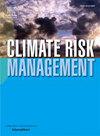应对洪水风险管理和土地使用规划决策中的不确定性:新西兰奥特亚罗瓦的启示
IF 4.8
2区 环境科学与生态学
Q1 ENVIRONMENTAL SCIENCES
引用次数: 0
摘要
强度和频率不断增加的洪水给城市地区的风险管理和土地利用规划带来了巨大挑战。气候变化导致的洪水模式变化的不确定性进一步加剧了这一挑战。然而,如何考虑这些不确定性,为洪水风险管理和土地利用规划决策提供信息,各地情况大不相同,文献中也没有明确的说明。本文通过研究新西兰奥特亚罗瓦地区在洪水风险管理和土地利用规划中如何处理不确定性,对此有所贡献。根据地方层面的经验数据,研究结果表明,新西兰奥特亚罗瓦的决策者在考虑和交流不确定性方面面临挑战,原因是普遍存在过时的方法和监管限制、分散的风险治理,以及缺乏对不同利益相关者对洪水风险的不同看法和假设的适当理解。根据研究结果,本文讨论了国家级适应性洪水风险治理在帮助确保不同辖区和各级政府在将不确定性纳入洪水风险管理和土地利用规划方面的一致性和连贯性方面的关键作用。这包括提供将不确定性纳入决策的国家指令,同时为地方层面的创新和有针对性的可变性留有余地。本文章由计算机程序翻译,如有差异,请以英文原文为准。
Dealing with uncertainty in flood risk management and land use planning decisions: Insights from Aotearoa New Zealand
Flooding with increasing intensity and frequency is presenting significant challenges for risk management and land use planning in urban areas. This is further exacerbated by uncertainties regarding how flood patterns are changing because of climate change. However, how such uncertainties are considered to inform flood risk management and land use planning decisions can vary largely from place to place and remain unclear in the literature. This paper contributes to this by examining how uncertainty is dealt with in flood risk management and land use planning in Aotearoa New Zealand. Drawing on empirical data at the local level, findings indicate that Aotearoa New Zealand’s decision-makers face challenges in considering and communicating uncertainty due to the prevalence of outdated approaches and regulatory constraints, fragmented risk governance, and lack of appropriate understanding of different perceptions and assumptions regarding flood risk between different stakeholders. Based on findings, the paper discusses the critical role of a national-level adaptive flood risk governance in helping to ensure consistency and coherency across different jurisdictions and levels of government, regarding the incorporation of uncertainty into flood risk management and land use planning. This includes the provision of national directives for incorporating uncertainty in decision-making whilst leaving room for innovation and targeted variability at the local level.
求助全文
通过发布文献求助,成功后即可免费获取论文全文。
去求助
来源期刊

Climate Risk Management
Earth and Planetary Sciences-Atmospheric Science
CiteScore
8.20
自引率
4.50%
发文量
76
审稿时长
30 weeks
期刊介绍:
Climate Risk Management publishes original scientific contributions, state-of-the-art reviews and reports of practical experience on the use of knowledge and information regarding the consequences of climate variability and climate change in decision and policy making on climate change responses from the near- to long-term.
The concept of climate risk management refers to activities and methods that are used by individuals, organizations, and institutions to facilitate climate-resilient decision-making. Its objective is to promote sustainable development by maximizing the beneficial impacts of climate change responses and minimizing negative impacts across the full spectrum of geographies and sectors that are potentially affected by the changing climate.
 求助内容:
求助内容: 应助结果提醒方式:
应助结果提醒方式:


